小学英语介词的使用(1)
小学英语介词短语(好)
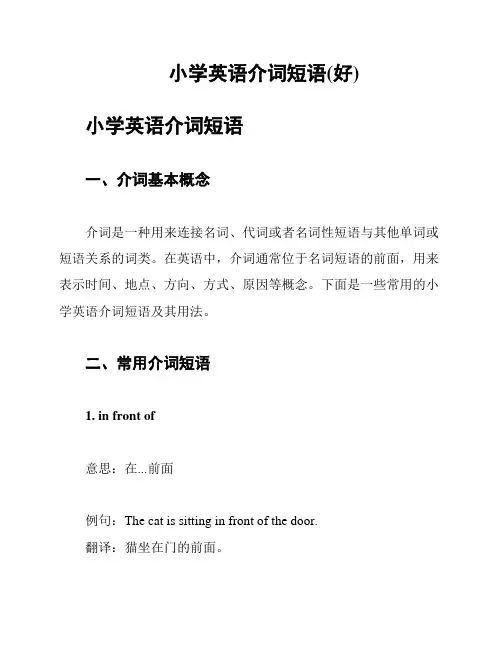
小学英语介词短语(好)小学英语介词短语一、介词基本概念介词是一种用来连接名词、代词或者名词性短语与其他单词或短语关系的词类。
在英语中,介词通常位于名词短语的前面,用来表示时间、地点、方向、方式、原因等概念。
下面是一些常用的小学英语介词短语及其用法。
二、常用介词短语1. in front of意思:在...前面例句:The cat is sitting in front of the door.翻译:猫坐在门的前面。
2. at school意思:在学校例句:I study English at school.翻译:我在学校学英语。
3. on the table意思:在桌子上例句:The book is on the table.翻译:书在桌子上。
4. under the tree意思:在树下例句:We had a picnic under the tree. 翻译:我们在树下野餐。
5. with a friend意思:和朋友在一起例句:I like playing soccer with a friend. 翻译:我喜欢和朋友一起踢足球。
6. by the beach意思:在海滩旁边例句:They built sandcastles by the beach. 翻译:他们在海滩旁边堆沙堡。
7. for breakfast意思:作为早餐例句:I had cereal for breakfast.翻译:我吃了谷物当早餐。
8. after school意思:放学后例句:Let's go to the park after school. 翻译:放学后我们去公园。
9. in the morning意思:在早晨例句:I like to jog in the morning.翻译:我喜欢早晨慢跑。
10. with a smile意思:带着微笑例句:She always greets everyone with a smile.翻译:她总是带着微笑向每个人打招呼。
小学英语语法-介词
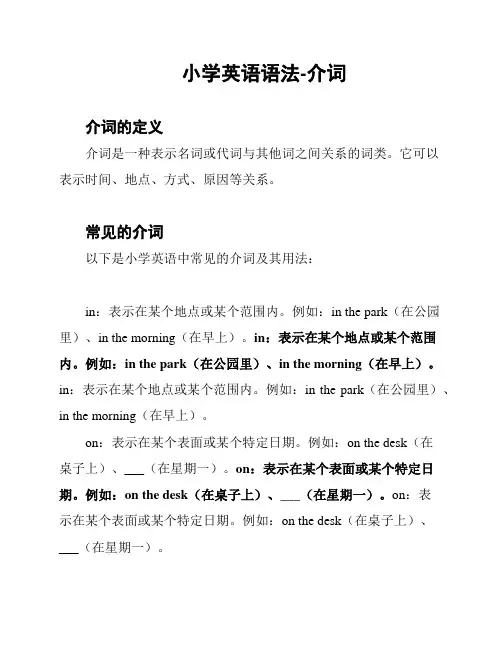
小学英语语法-介词介词的定义介词是一种表示名词或代词与其他词之间关系的词类。
它可以表示时间、地点、方式、原因等关系。
常见的介词以下是小学英语中常见的介词及其用法:in:表示在某个地点或某个范围内。
例如:in the park(在公园里)、in the morning(在早上)。
in:表示在某个地点或某个范围内。
例如:in the park(在公园里)、in the morning(在早上)。
in:表示在某个地点或某个范围内。
例如:in the park(在公园里)、in the morning(在早上)。
on:表示在某个表面或某个特定日期。
例如:on the desk(在桌子上)、___(在星期一)。
on:表示在某个表面或某个特定日期。
例如:on the desk(在桌子上)、___(在星期一)。
on:表示在某个表面或某个特定日期。
例如:on the desk(在桌子上)、___(在星期一)。
at:表示在具体的时间或某个地点。
例如:at 7 o'clock(在7点)、___(在学校)。
at:表示在具体的时间或某个地点。
例如:at 7 o'clock(在7点)、___(在学校)。
at:表示在具体的时间或某个地点。
例如:at 7 o'clock(在7点)、___(在学校)。
to:表示向某个地点或某个目标。
例如:go to the supermarket (去超市)。
to:表示向某个地点或某个目标。
例如:go to the supermarket(去超市)。
to:表示向某个地点或某个目标。
例如:go to the supermarket(去超市)。
from:表示从某个地点或某个时间开始。
例如:___(从星期一到星期五)。
from:表示从某个地点或某个时间开始。
例如:___(从星期一到星期五)。
from:表示从某个地点或某个时间开始。
例如:___(从星期一到星期五)。
by:表示通过某种方式或某个工具。
小学英语:介词顺口溜 (1)
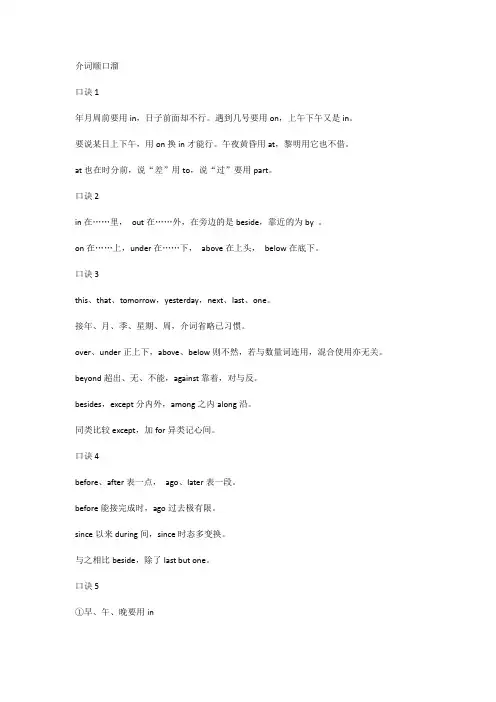
介词顺口溜口诀1年月周前要用in,日子前面却不行。
遇到几号要用on,上午下午又是in。
要说某日上下午,用on换in才能行。
午夜黄昏用at,黎明用它也不借。
at也在时分前,说“差”用to,说“过”要用part。
口诀2in在……里,out在……外,在旁边的是beside,靠近的为by 。
on在……上,under在……下,above在上头,below在底下。
口诀3this、that、tomorrow,yesterday,next、last、one。
接年、月、季、星期、周,介词省略已习惯。
over、under正上下,above、below则不然,若与数量词连用,混合使用亦无关。
beyond超出、无、不能,against靠着,对与反。
besides,except分内外,among之内along沿。
同类比较except,加for异类记心间。
口诀4before、after表一点,ago、later表一段。
before能接完成时,ago过去极有限。
since以来during间,since时态多变换。
与之相比beside,除了last but one。
口诀5①早、午、晚要用inin the morning 在早上in the afternoon 在下午in the evening在晚上in the day 在白天②黎明、午、夜、点与分用atat night 在夜间six o‘clock 在6点钟at 7:30 在7点半at nine fif** 在9点15分at the weekend 在周末③年、月、年月、季节、周用in。
例;in 1986 在1986年in 1927 在1927年in april 在四月in march 在三月in december 1986 1986年12月in july l983 1983年7月in spring 在春季in summer 在夏季in autumn 在秋季in winter 在冬季in the fist week of this semester 这学期的第一周in the third week 在第三周④阳光、灯、影、衣、冒雨用in,在阳光下,在灯下,在树阴下,穿衣、着装、冒雨等都要用in。
关于小学介词英语语法大全
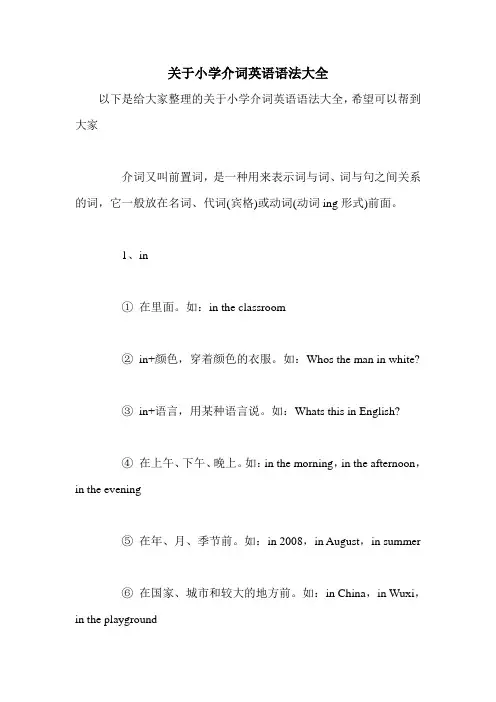
关于小学介词英语语法大全以下是给大家整理的关于小学介词英语语法大全,希望可以帮到大家介词又叫前置词,是一种用来表示词与词、词与句之间关系的词,它一般放在名词、代词(宾格)或动词(动词ing形式)前面。
1、in①在里面。
如:in the classroom②in+颜色,穿着颜色的衣服。
如:Whos the man in white?③in+语言,用某种语言说。
如:Whats this in English?④在上午、下午、晚上。
如:in the morning,in the afternoon,in the evening⑤在年、月、季节前。
如:in 2008,in August,in summer⑥在国家、城市和较大的地方前。
如:in China,in Wuxi,in the playground⑦固定搭配。
如:in the middle of(在中间),do well in(擅长),in the day(在白天),take part in(参加),stay in bed(躺在床上),in the street(在街上)2、on①在上面。
如:on the desk②用在某一天(上、下午)前。
如:on the 5th of May,on Sunday,on Monday morning③以Day结尾的节日前。
如:on Childrens Day,on New Years Day④固定搭配。
如:on foot(步行),on duty(值日),put on(穿上),get on(上车) turn on(打开),on the right / left(在右边/左边),on the wall (在墙上),on Zhongshan Road(在中山路上)注意:树上长的水果用on the tree;不是树上长的外来物用in the tree。
如:I can see a lot of apples on the tree. There is a boy in the tree.3、at①在某个时刻前。
小学英语常用介词用法
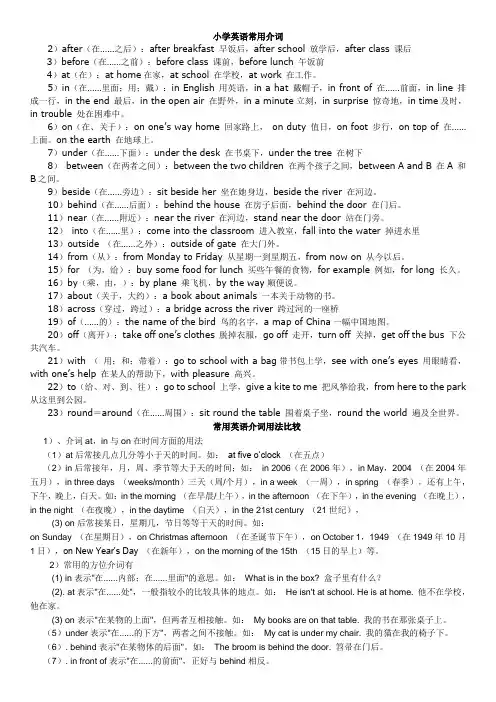
小学英语常用介词2)after(在……之后):after breakfast 早饭后,after school 放学后,after class 课后3)before(在……之前):before class 课前,before lunch 午饭前4)at(在):at home在家,at school 在学校,at work 在工作。
5)in(在……里面;用;戴):in English 用英语,in a hat 戴帽子,in front of 在……前面,in line 排成一行,in the end 最后,in the open air 在野外,in a minute立刻,in surprise 惊奇地,in time及时,in trouble 处在困难中。
6)on(在、关于):on one’s way home 回家路上,on duty 值日,on foot 步行,on top of 在……上面。
on the earth 在地球上。
7)under(在……下面):under the desk 在书桌下,under the tree 在树下8)between(在两者之间):between the two children 在两个孩子之间,between A and B 在A 和B之间。
9)beside(在……旁边):sit beside her 坐在她身边,beside the river 在河边。
10)behind(在……后面):behind the house 在房子后面,behind the door 在门后。
11)near(在……附近):near the river 在河边,stand near the door 站在门旁。
12)into(在……里):come into the classroom 进入教室,fall into the water 掉进水里13)outside (在……之外):outside of gate 在大门外。
小学一年级英语介词的知识点
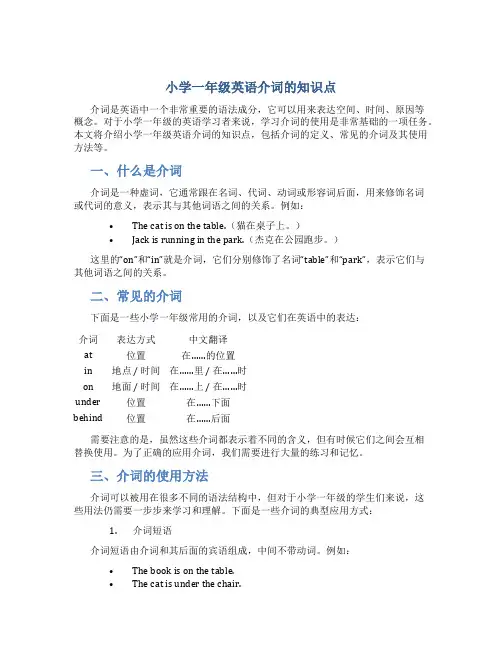
小学一年级英语介词的知识点介词是英语中一个非常重要的语法成分,它可以用来表达空间、时间、原因等概念。
对于小学一年级的英语学习者来说,学习介词的使用是非常基础的一项任务。
本文将介绍小学一年级英语介词的知识点,包括介词的定义、常见的介词及其使用方法等。
一、什么是介词介词是一种虚词,它通常跟在名词、代词、动词或形容词后面,用来修饰名词或代词的意义,表示其与其他词语之间的关系。
例如:•The cat is on the table.(猫在桌子上。
)•Jack is running in the park.(杰克在公园跑步。
)这里的“on”和“in”就是介词,它们分别修饰了名词“table”和“park”,表示它们与其他词语之间的关系。
二、常见的介词下面是一些小学一年级常用的介词,以及它们在英语中的表达:介词表达方式中文翻译at 位置在……的位置in 地点 / 时间在……里 / 在……时on 地面 / 时间在……上 / 在……时under 位置在……下面behind 位置在……后面需要注意的是,虽然这些介词都表示着不同的含义,但有时候它们之间会互相替换使用。
为了正确的应用介词,我们需要进行大量的练习和记忆。
三、介词的使用方法介词可以被用在很多不同的语法结构中,但对于小学一年级的学生们来说,这些用法仍需要一步步来学习和理解。
下面是一些介词的典型应用方式:1.介词短语介词短语由介词和其后面的宾语组成,中间不带动词。
例如:•The book is on the table.•The cat is under the chair.2.时间介词时间介词表示某个动作或事件发生的时间,可以用来回答“什么时候”的问题。
例如:•I usually go to bed at 10 o’clock.•We have English class on Monday.3.地点介词地点介词用来描述某个事物或人所处的位置,可以用来回答“在哪里”的问题。
小学英语介词的用法总结
介词的用法1 .表示地点位置的介词1)at ,in, on, to, forat⑴表示在小地方;(2)表示“在……附近,旁边”in⑴表示在大地方;(2)表示“在.一范围之内”。
on表示毗邻,接壤,“在……上面”。
to表示在……范围外,不强调是否接壤;或“到……”2)above, over, on 在……上above指在……上方,不强调是否垂直,与below相对;over指垂直的上方,与under相对,但over与物体有一定的空间,不直接接触。
on表示某物体上面并与之接触。
The bird is flying above my head. There is a bridge over the river.He put his watch on the desk.3)below, under 在... 下面under表示在…正下方below表示在……下,不一定在正下方There is a cat under the table.Please write your name below the line.4)in front [frant]of, in the front of 在..... 前面in front of…意思是“在……前面”,指甲物在乙物之前,两者互不包括;其反义词是behind (在.. 的后面)。
There are some flowers in front of the house.(房子前面有些花卉。
)in the front of意思是"在…..的前部”,即甲物在乙物的内部.反义词是at the back of…(在……范围内的后部)。
There is a blackboard in the front of our classroom.我们的教室前边有一块黑板。
Our teacher stands in the front of the classroom.我们的老师站在教室前.(老师在教室里)5)beside,behindbeside表示在... 旁边behind表示在... 后面2 .表示时间的介词1)in , on,at 在... 时in表示较长时间,如世纪、朝代、时代、年、季节、月及一般(非特指)的早、中、晚等。
小学英语介词总结
小学英语介词总结介词是英语语法中重要的一部分,尤其对于小学生来说,理解和使用介词是掌握英语表达的关键。
以下是对小学英语介词的总结:1、关于时间的介词at:通常用于表示一个具体的时间点,例如 "at 7 o'clock"。
in:通常用于表示一个时间段,例如 "in the morning"。
on:用于表示在某一天或某一天的特定时间,例如 "on Monday"或"on my birthday"。
before:表示在某个时间之前,例如 "before dinner"。
after:表示在某个时间之后,例如 "after school"。
2、关于位置的介词in:用于表示在一个封闭的空间内,例如 "in the box"。
on:用于表示在一个平面上,例如 "on the table"。
under:表示在某物的正下方,例如 "under the table"。
above:表示在某物的上方,但是不一定是正上方,例如 "above the table"。
beside:表示在某物的旁边,例如 "beside the book"。
3、关于方向的介词to:用于表示朝向某个方向或地点,例如 "go to school"。
from:用于表示从一个地方或位置到另一个地方或位置,例如 "come from school"。
towards:表示朝向某个方向或地点,但是不一定到达那里,例如"walk towards the park"。
4、关于原因的介词because:用于表示原因或理由,例如 "I am late because I missed the bus"。
(完整版)小学英语常用介词及用法
常见介词及用法(一)表示时间的介词1.英语里最常见的时间介词有:at, in, on, before, after和from。
2.at , in和on这三个词都表示时间。
✧at主要指具体的钟点:at half past eight 在八点半✧in一般指某一段时间:in January 在一月份✧on指具体在某一天:on Monday 在星期一3.before和after表示时间的先后顺序。
✧before表示“在……之前”。
You should wash your hands before eating. 吃饭前你应该洗手。
✧after表示“在……之后”。
They often play basketball after dinner. 他们放学后经常打篮球。
4.from作时间介词含有“从……开始”的意思,常和to连用,组成“from…to…”的结构,表示“从……到……”的意思。
We go to school from Monday to Friday. 我们从周一到周五上学。
(二)表示方位的介词,也就是表示位置和地点的介词。
1.小学阶段常见的方位介词有:on, in, at, under, over, above, below, about,around, between等。
2.on, over和above这三个词都有“在……上面”的意思,但它们所表示的方位还是有些不同。
✧on表示两个物体的表面相互接触。
如:There is a book on the desk. 桌上有一本书。
The boy is sleeping on the desk. 那个孩子睡在地上。
✧over表示“在……的正上方”,两个物体表面没有接触。
如:There is a light bulb over my head. 在我头顶上有一个灯泡。
✧above表示两个物体中一个在另一个的上方,如:The plane is flying above the clouds. 飞机上云层上飞行。
小学英语语法连词介词
小学英语语法连词、介词(一)、GrammarPart one 介词一、什么是介词用来表示句子中某一个词或短语与另外一个词或短语之间的关系的词。
二、介词的用法考点一:表示时间的介词in, on, at的用法in表示在某一时间段,常用在月、年、季节以及泛指的上午、下午或晚上如:in 2013 in January in summer in the morningon表示在具体的某一天或某一天的上午、下午或晚上如:on Tuesday on February 5th on the morning of August 8that表示在某一时间点如:at 10:20 at night at lunchtime考点二:表示地点的介词in, at, on的用法in表示较大的地方,也可表示“在......之内”如:in Nanjing in America in the gardenat表示较小的地方,也可表示“在......处”如:at the station at the party at homeon表示与某物表面接触,也可表示在某物之上如:on the moon on the ground on the right on the farm考点三:表示方向的介词from, to, forfrom表示起点,意为“从......来”如:Mr. Green comes from England.I’ve got a Christmas present from my parentsto表示终点,强调动作的目的地如:Let’s go to school. He is walking up to the door.for表示目的地的方向,意为“往.......去”如:Is this train for Beijing?考点四:表示方式的介词with, inwith表示使用某种工具、身体某部位来做某事如:I wash my hands with water.We see with our eyes and listen with our ears.in表示使用某种语言如:Can you say it in English?一、填上合适的介词1. There is a supermarket _________ my house.2. Gao Shan is ______ duty today.3. Liu Tao often helps me ________ my study.4. My birthday is ________ October 21.5. There are lots of apples _______ the tree.6. I like reading and I can learn a lot ______ it.7. I can’t find the basketball. Maybe it’s ______ the door.8. I can buy some flowers _______ you.9. I get up ______ seven _______ the morning.10. Jack, please look _______ your things.二、根据中文提示,完成下列句子1. 墙上有许多标志。
- 1、下载文档前请自行甄别文档内容的完整性,平台不提供额外的编辑、内容补充、找答案等附加服务。
- 2、"仅部分预览"的文档,不可在线预览部分如存在完整性等问题,可反馈申请退款(可完整预览的文档不适用该条件!)。
- 3、如文档侵犯您的权益,请联系客服反馈,我们会尽快为您处理(人工客服工作时间:9:00-18:30)。
介词与名词的固定搭配
1.in a word 总而言之
2. in life 一生中
3.in time 及时
4.at sea在海上
5.on time准时
6.in town在城镇里
7.on foot步行
8.in English用英语
9.in a low voice 小声点10.in trouble处于困难11.in fact事实上12.in a hurry匆忙13.in the street在街上14.at the meeting在会上
15.in space在太空16.by spaceship乘坐宇宙飞船17.on display陈列18.in the day在白天19.at dinner在吃正餐20.at the table在桌子旁21.on show展览中22.in a short while一会儿23.at school在学校24.in silence安静
25.in this way用这种方法26.at the same time同时27.on one’s way to在某人去......的路上28.by hand 亲手29.by the end of到......结束时30.out of sight 消失31.in the distance在远方32.out of work 失业33.on the radio通过无线电34.in the middle of 在......中间35.on the left/right在左/右边
36.on the other side of在......的另一边
37.to one’s surprise/joy使某人吃惊/高兴的是.......
38.in bed卧床39.in all总计40.of course当然41.in surprise惊奇地42.at first起初43.by the way顺便说44.in the end最后45.at least至少
46.in order按顺序47.at all根本48.at the foot of在......脚下49. In line成一条直线50.at work 在工作51.day by day日复一日
52.one by one一个接一个地53.at the back of在......后面54.out of breath上气不接下气55.by the time到......的时候56.in the air在空中57.on duty值日58.to this
day直到今天
59.on top of在......的山方
介词与形容词、过去分词的固定搭配
1.be full of充满
2.be filled with充满
3.be born in 出生于
4.be sure of确信
5.be satisfied with sth.对某事感到满意
6.be strict with sb.对某人要求严格
7.be excited about对......感到兴奋
8.be amazed at对......感到惊奇9.be late for迟到介词与动词的固定搭配
ugh at嘲笑
2.take part in加入
3.think of想起
4.go on with sth.继续做某事
5.worry about 为......担心
6.look after照看
7.take care of关心
8.look at看9.look like看起来像10.look for寻找11.hear from收到......的来信12.listen to听
13.arrive in到达大地方14.arrive at到达小地方15.get to到达16.wait for等候17.agree with 同意18.think about考虑19.catch up with赶上,超过e from来自21.pay for支付22.shout at对......喊叫23.talk about谈论
24.knock at the door敲门25.play with玩耍
26.point at/to指向27.help...with...帮助...做...
28.hear of听说29.get on with sb.与某人相处30.move to搬去...... 31.do well in在...做的好32.fall behind落后33.ask for要求34.take away 拿走35.turn...into...把...变成... 36.go to school去上学37.go to bed去睡觉38.take/catch hold of抓住39.decide on决定40.hand in交上来41.say hello to 向...问好42.have nothing to do with 与...无关43.base on以...为根据44.keep out of不让...进入45.go to the cinema去看电影46.look
forward to盼望47.in according to根据...
一.在空中填入适当的介词
1. ______ noon
2.______ the end of the meeting
3.______ the morning of April 2nd
4.______ a cold night
5. ______ autumn
6. ______ his twenties
7.______ the twenty-first century 8.______ a quarter to ten 9.______ the age of twelve 10. ______
Mid-autumn Day 11. Don’t forget to wash hands ______ meals
12. Please turn ______ Page 20
13. There is a big market ______ the end of the road.
the bus stop.
15. He’ll give us a talk ______ the history of our party.
16. Mike came to China ______ March, 2000. He has been in China ______ 14 years.
17. I prefer fruit ______ beef. Miss Zhou agrees ______ me.
18. It’s very kind ______ you to carry the box ______ me.
19. Don’t read ______ the sun. It’s bad ______ your eyes.
20. I always get ______ well with my classmates
二.用所给介词填空
Xiao Ming is a middle school student. 1 home he
usually watches TV till late 2 night and doesn’t review(复习) his English lessons. 3 English class, he often talks 4 his classmates and doesn’t listen 5 his teacher carefully. When(当...时) the teacher asks(要求)the class to speak English, he usually speaks Chinese. While(当...时) he is doing his homework, he’s always thinking 6 playing computer games.
三.找错
1.We visited the old man in Sunday afternoon.
_________________________________________
2.He became a writer at his twenties.
_________________________________________。
